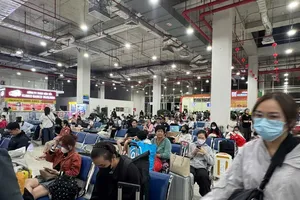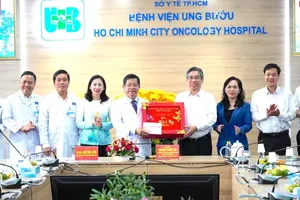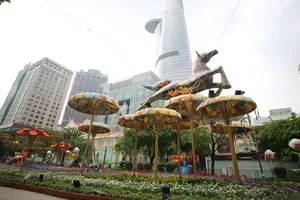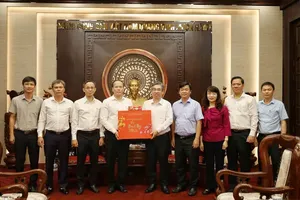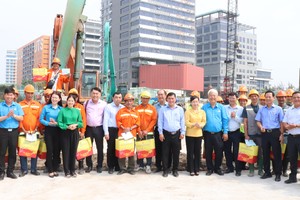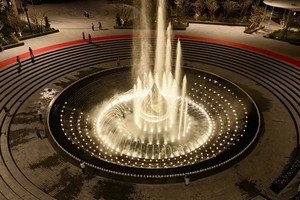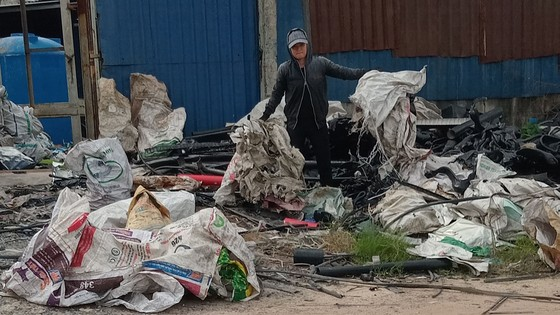 |
| Scrap is indiscriminately discarded on the street at a scrap collection and recycling facility in Binh Hung Hoa B Ward, Binh Tan District, HCMC |
Living together with pollution
A pothole-filled alley led SGGP reporters to an empty lot. It is near the Ba Tri bridge area (in Pham Van Hai commune, Binh Chanh district), where various scrap recycling facilities are located. The black smoke of a scrap recycling business rose from afar; as they neared, the reporters were smothered by the smoke and pungent odor. There are roughly 10 scrap recycling facilities in this area. None of them has an address, name tag, or fire protection system, and the factory is surrounded by old, rusted corrugated iron sheets.
The path along Ba Tri canal path (part of Vinh Loc B Commune, Binh Chanh District) is numerous waste disposal and scrap recycling facilities. Scrap is gathered in mountain-sized piles, with the majority of it placed open-air.
Mr. Tran Minh Kha (on Vinh Loc Street) expressed his displeasure at a scrap collection place in Vinh Loc B Commune, saying, every time it rains, all the rainwater coming out of the scrap yards straightly flows to the canal. Residents are concerned that tainted rainwater would seep through the soil into groundwater, threatening people's health.
Located between Vinh Loc B commune (Binh Chanh district) and Binh Hung Hoa B ward (Binh Tan district), the alley is less than 500 meters long but it has up to 3 recycling facilities for packaging scrap. The space is cramped, scraps are heaped up in front of the gate, and there is a loud mechanical sound and an awful smell that makes the reporters feel queasy and uneasy. Likewise, the spot where they most worry about scrap recycling is the bottom section of the Binh Thuan bridge (in Binh Hung Hoa B ward), which has several facilities that lack addresses and name tags.
According to professionals, this industry causes pollution, potential hazards of fire and explosion, and frustration for people due to fragmented business and a lack of a local government management plan.
Competent authority must engage
Assoc. Prof. Dr. Phung Chi Sy, Vice President of the Vietnam Association for the Protection of Nature and Environment, stated most spontaneous scrap recycling facilities employ outdated technology, industrial fuels, and unsafe procedures. As a result, it produces a lot of poisonous smoke and dust, which causes significant environmental pollution. This pollution impacts people's health, particularly those who frequently interact with or live near recycling operations.
These scrap recycling facilities are reported to make little profit. However, it increases pollutants. To protect the environment, Ho Chi Minh City's competent agencies should devise a strategy to relocate these facilities into industrial suitable clusters and parks. Simultaneously, they should assist them with preferential financing to convert recycling technology following the provisions of the Environmental Law.
According to Assoc. Prof. Dr. Le Thi Kim Oanh, Dean of the Faculty of Environment and Technology, Van Lang University, said that spontaneous scrap recycling facilities have small scale and little trading capital. Therefore, investment in environmental protection equipment is almost nonexistent. Moreover, because of the use of antiquated technology, the goods (plastic beads) from these facilities are of low quality and value.
An environmental expert emphasized the opinion: "When fully supported, these facilities will have better operating conditions and even play an important role in realizing the city's circular economy development goals".
According to government statistics, a thousand waste recycling facilities have recently opened in HCMC. Most are small and medium-sized businesses with antiquated equipment, mechanical systems, and recycling technology.
Survey results show that over 90 percent of recycling facilities lack wastewater treatment systems, and approximately 80 percent lack exhaust gas treatment systems, resulting in substantial environmental pollution.
Ho Chi Minh City creates around 9,000 tons of residential solid waste every day. Of these, approximately 4,000 tons of industrial solid waste (waste paper, plastic, nylon, glass, metal) can be recycled and reused.
